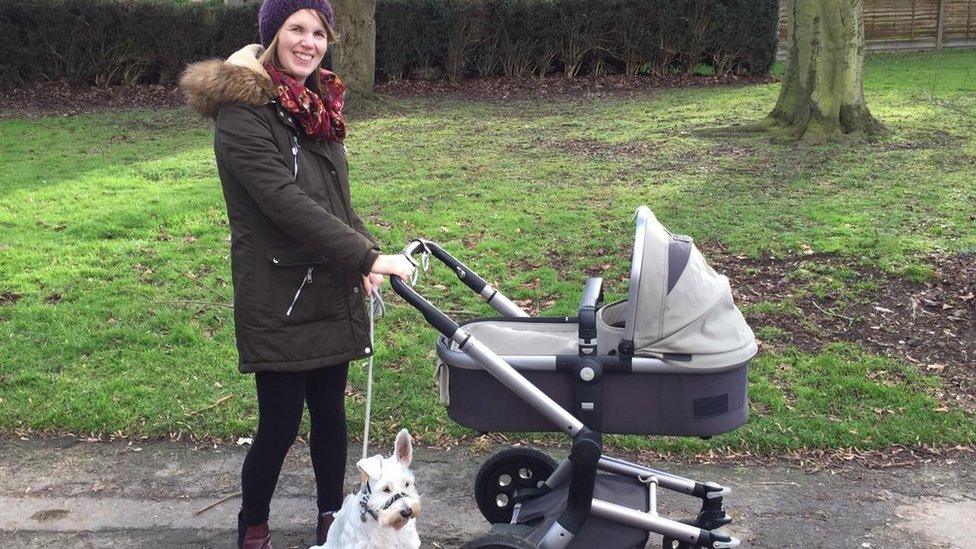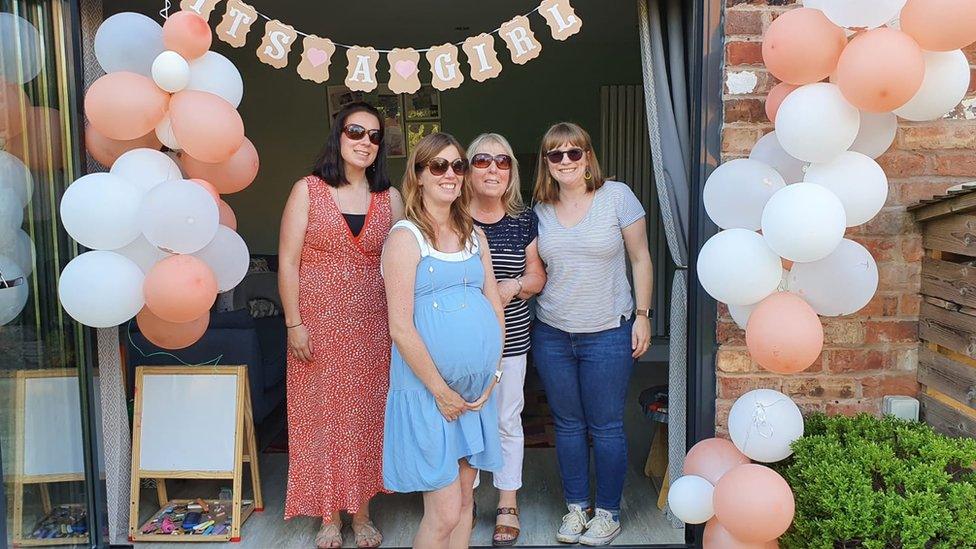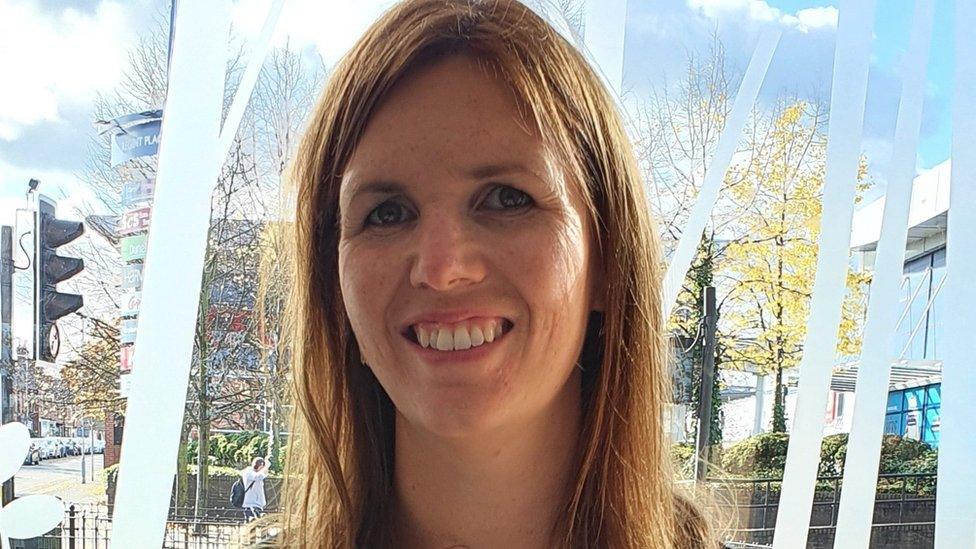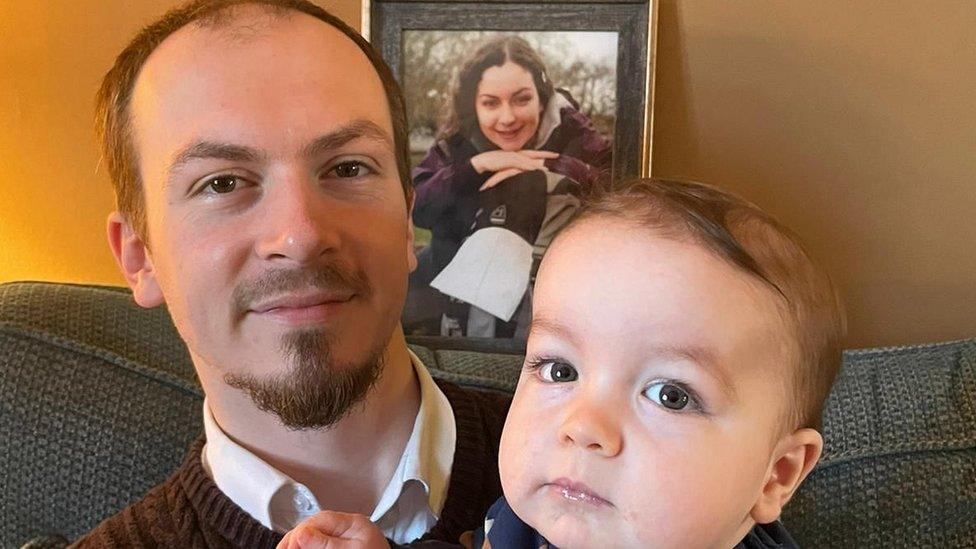Mother's post-birth death could have been prevented, inquest finds
- Published

Rachael Chloe Walker had conceived her second child after IVF treatment
A woman who died shortly after giving birth could have survived had a hospital trust not "missed opportunities", an inquest found.
Rachael Chloe Walker - known as Chloe - died at Royal Derby Hospital's maternity unit on 19 June 2021.
Derby Coroner's Court heard a plan for the 36-year-old had not been added to her electronic notes and hospital staff were using outdated guidance.
Ms Walker's family welcomed the conclusion.
'Serious issues'
The inquest heard Ms Walker, from Castle Donington, Leicestershire, had conceived her second child after IVF treatment, but had "recognised risk factors" and was diagnosed with placenta praevia, a condition in which the placenta partially or completely blocks the neck of the uterus, which can affect delivery.
In the 34th week of her pregnancy a consultant obstetrician said her case should be reviewed in three weeks, with a Caesarean section booked in for week 38.
This was not written into her medical notes, the inquest heard, "with the result that the obstetric registrar who saw [her] at week 37 was unaware of the plan".
The trust had also "had not adopted national guidance issued in September 2018", which would have seen Ms Walker booked in for a Caesarean earlier.
At about 02:40 BST on 19 June, Ms Walker collapsed at her home, and an ambulance was called as she was heavily bleeding.
She was taken to Royal Derby Hospital's maternity unit, where her daughter was delivered successfully, but she suffered three cardiac arrests.
Ms Walker was declared dead at 07:40.

A baby shower had been thrown for Ms Walker a few weeks before she died
In a narrative conclusion, coroner Peter Nieto gave a cause of death as a placental haemorrhage at 37 weeks of pregnancy, along with an amniotic fluid embolism and placenta praevia.
"The trust accepted these were missed opportunities to avoid [Ms Walker's] death and had they not been missed it is likely that [she] would not have died because delivery would have occurred well before 19 June, or, if antepartum haemorrhage had occurred during admission, it would have been successfully managed," he said.
"It is probable that her death would have been avoided if a delivery plan made for her had been recorded in her notes and acted upon, and if [UHDB] had incorporated national guidance issued in September 2018 which provided for consideration for earlier Caesarean delivery."
Mr Nieto also identified "serious issues" relating to UHDB that arose from the evidence, including no system in maternity to relay information from ambulance staff, no blood for urgent surgery kept in the unit, a delay in calling for the on-call consultant anaesthetist and "no robust system in place for a major obstetric haemorrhage".
'Agonising loss'
He issued a prevention of future death notice due to concerns the trust had failed to make enough changes to its procedures.
"Future lives may be at risk because I'm not satisfied that the trust is adopting sufficient robust processes," he said.
After the conclusion of the inquest, Hayley Webster said her sister's death "has been devastating" for the family.
"[It] was made all the more painful that it occurred at a time when we should have been focusing on celebrating the birth of a new baby," she said in a statement on behalf of the family.
"What makes Chloe's death more distressing is that it could have been prevented."
Ms Webster said hearing details during the inquest of the "chaotic" maternity ward was "extremely difficult for us to hear and something we will never be able to come to terms with".
She also cited a probe by the Healthcare Safety Investigation Branch (HSIB), which found Ms Walker and two other women might have survived had recommendations had been implemented earlier.
"We hope that the learnings from Chloe's death will lead to an improvement in patient safety for the future, so that no other families have to go through the agonising loss that we have," she said.

Rachael Chloe Walker died on 19 June 2021
Garry Marsh, executive chief nurse at UHDB, said: "Our heartfelt condolences are with Chloe's family. The care we provided fell short of the standard our patients deserve for which we are very sorry.
"We accept there were missed opportunities and we have already acted on the learning from this sad case, and six other maternity cases which were recently reviewed as part of an independent maternity learning review that the trust had requested.
"All of the immediate safety recommendations from the review are being addressed, many of which the coroner referenced during the inquest into Chloe's death, and we will continue to make further improvements to the safety and experience of women under our care."

Follow BBC East Midlands on Facebook, external, on Twitter, external, or on Instagram, external. Send your story ideas to eastmidsnews@bbc.co.uk, external.
Related topics
- Published22 February 2023

- Published8 March 2022
